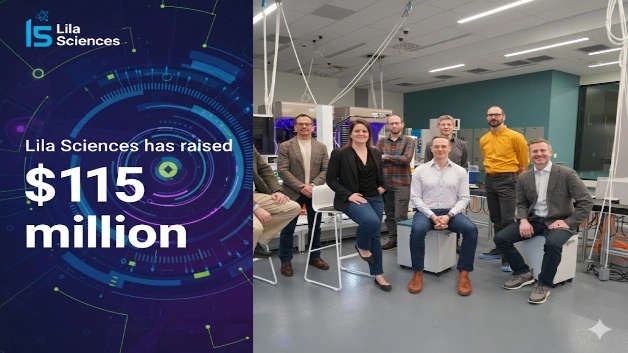The global scientific research sector has witnessed a watershed moment as Lila Sciences, the pioneering AI-driven laboratory platform, secured a commanding $115 million Series A extension funding round. Led by Nvidia Ventures with strategic participation from Sequoia Capital, Andreessen Horowitz, and Lux Capital alongside existing backer Flagship Pioneering, this capital infusion represents an irrevocable validation that artificial intelligence will fundamentally reshape how humanity conducts scientific research through automated, algorithmically-optimized experimental discovery infrastructure.
AI Laboratory Infrastructure Transforms Science with $115M Investment
Lila Sciences’ $115 million investment catalyzes a profound transformation in scientific discovery accessibility and democratization. The San Francisco-based company, founded in 2023 by Flagship Pioneering, has engineered a revolutionary platform deploying sophisticated AI models throughout physical laboratory infrastructure, creating an unprecedented “scientific superintelligence” enabling researchers to conduct experiments across chemistry, biology, and materials science with unprecedented speed. The scientific research sector confronts technological inevitability: institutions worldwide recognizing the societal value of AI-accelerated discovery while maintaining rigorous experimental validation frameworks. Lila’s technology transforms fragmented manual experimentation into unified computational intelligence, aggregating distributed laboratory capabilities into precise hypothesis-testing solutions.
This funding—bringing total Series A to $350 million and overall capital raised to $550 million—enables aggressive automated laboratory expansion, addressing critical research infrastructure gaps while amplifying scientific productivity rather than restricting human creativity. The platform offers scalable solutions where demand for AI-augmented experimental research has reached critical mass, propelling the company’s valuation beyond $1.3 billion.
Leading Venture Capitals Spearhead Major AI Science Funding
Nvidia Ventures’ strategic leadership of this funding round demonstrates sophisticated insight into the convergence of artificial intelligence, computational biology, and materials science innovation. The chipmaker’s venture arm, renowned for identifying transformative AI companies at pivotal growth stages, recognized Lila’s defensible market position within the scientific discovery ecosystem where GPU-accelerated machine learning models process experimental data at unprecedented scale.
Participation from Sequoia Capital, Andreessen Horowitz, and Lux Capital—joining existing investor Flagship Pioneering—confirms unwavering confidence in execution capabilities and market trajectory. This syndicated $115 million raise provides crucial strategic relationships spanning pharmaceutical companies, materials manufacturers, and research institutions essential for navigating complex scientific validation landscapes. AI laboratory infrastructure funding has historically concentrated on narrow computational tools and isolated software solutions. These venture capital firms’ commitment redirects substantial resources toward integrated physical-digital systems, promising enhanced experimental throughput and reduced discovery timelines across fundamental and applied research.
How AI Laboratory Infrastructure Empowers Scientific Breakthrough Acceleration
Lila Sciences’ technological architecture represents masterful applied artificial intelligence for modern scientific research. The system deploys sophisticated machine learning models continuously analyzing experimental outcomes, hypothesis validation, molecular interactions, and real-time data patterns—creating comprehensive scientific signatures that neural networks scrutinize for breakthrough opportunities. AI laboratory mechanisms extend beyond simple automation, identifying nuanced causal relationships across complex multi-variable experimental frameworks, chemical reaction pathways, and biological system dynamics.
These research insights, imperceptible through traditional manual methodologies, become unmistakable through aggregated laboratory intelligence trained on vast experimental datasets spanning chemistry, biology, and materials science. Scientific rigor is addressed through transparent AI-guided experimental design with full reproducibility protocols—enabling accountability while preserving discovery efficiency. Computational power manifests in faster hypothesis iteration, reduced experimental waste, and enhanced breakthrough probability across therapeutic development, sustainable materials discovery, and fundamental scientific understanding.
San Francisco Biotech Dominates AI-Driven Research Innovation Ecosystem
Lila Sciences’ San Francisco origins connect the company to an ecosystem increasingly recognized for translating artificial intelligence expertise into accessible laboratory technology platforms. The Bay Area’s concentration of AI talent, biotech infrastructure, and computational resources creates fertile ground for innovations at disciplinary intersections where machine learning and physical experimentation flourish. Market dominance stems from technological superiority combined with operational excellence in automated laboratory orchestration across Cambridge, Massachusetts facilities opening to conduct AI-guided experiments at industrial scale.
Global scientific discovery of Lila Sciences represents multi-trillion-dollar economic opportunity as pharmaceutical companies, materials manufacturers, and research institutions recognize AI-augmented experimentation cannot be replicated through traditional manual laboratory approaches. The platform enables researchers continuous, intelligent experimental design confidence across therapeutic discovery, materials innovation, and fundamental scientific breakthroughs.
AI Laboratory Revolution Democratizes Scientific Discovery Access
Lila Sciences’ artificial intelligence technology revolutionizes research by transforming resource-intensive manual experimentation into computationally-optimized discovery networks. Traditional scientific research operates on concentration paradigms: elite institutions commanding vast laboratory infrastructure, extensive personnel resources, and specialized equipment access. Lila’s platform inverts this model, aggregating experimental capabilities into emergent scientific intelligence accessible beyond traditional research centers.
The $115 million funding of Lila Sciences accelerates increasingly sophisticated AI model development and automated laboratory expansion, with the company announcing new Cambridge facilities serving as prototypes for scalable “AI Science Factories” combining machine learning with robotic experimentation infrastructure. Technological innovations improve continuously as the platform accumulates experimental data across diverse scientific domains and hypothesis spaces, creating formidable competitive advantages compounding over time through reinforcement learning mechanisms that optimize experimental strategies.
Conclusion
Lila Sciences’ $115 million Series A extension funding marks a decisive inflection point where artificial intelligence meets scientific discovery modernization imperatives, propelling valuation beyond $1.3 billion unicorn status. The company’s AI laboratory platform doesn’t merely automate—it illuminates, accelerates, and democratizes while extending experimental capabilities for thousands of researchers across pharmaceutical development, materials science, and fundamental biological understanding.
I’m Araib Khan, an author at Startups Union, where I share insights on entrepreneurship, innovation, and business growth. This role helps me enhance my credibility, connect with professionals, and contribute to impactful ideas within the global startup ecosystem.
